

Economic Theory. History of economic thought. The history of economic thought deals with different thinkers and theories in the subject that became political economy and economics from the ancient world to the present day.
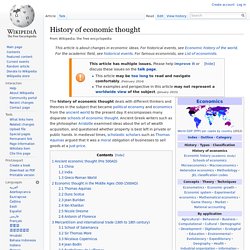
It encompasses many disparate schools of economic thought. Ancient Greek writers such as the philosopher Aristotle examined ideas about the art of wealth acquisition, and questioned whether property is best left in private or public hands. In medieval times, scholastic scholars such as Thomas Aquinas argued that it was a moral obligation of businesses to sell goods at a just price. Ancient economic thought (Pre 500AD)[edit] China[edit] Fan Li (also known as Tao Zhu Gong) (517 BC - ),[1] an adviser to King Goujian of Yue, wrote on economic issues and developed a set of 'golden' business rules.[2] India[edit] Chanakya (350 BC - ) wrote the Arthashastra, a treatise on statecraft, economic policy and military strategy. Greco-Roman World[edit] Adam Smith. 18th-century Scottish moral philosopher and political economist Adam Smith FRSA (16 June [O.S. 5 June] 1723[4] – 17 July 1790) was a Scottish economist, philosopher and author as well as a moral philosopher, a pioneer of political economy and a key figure during the Scottish Enlightenment,[5] also known as ''The Father of Economics''[6] or ''The Father of Capitalism''.[7] Smith wrote two classic works, The Theory of Moral Sentiments (1759) and An Inquiry into the Nature and Causes of the Wealth of Nations (1776).
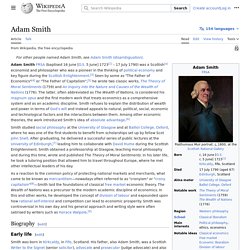
The latter, often abbreviated as The Wealth of Nations, is considered his magnum opus and the first modern work of economics. In his work, Adam Smith introduced his theory of absolute advantage.[8] Smith studied social philosophy at the University of Glasgow and at Balliol College, Oxford, where he was one of the first students to benefit from scholarships set up by fellow Scot John Snell.
Karl Marx. Karl Marx[note 1] (/mɑrks/;[4] German pronunciation: [ˈkaɐ̯l ˈmaɐ̯ks]; 5 May 1818 – 14 March 1883) was a German philosopher, economist, sociologist, journalist, and revolutionary socialist.
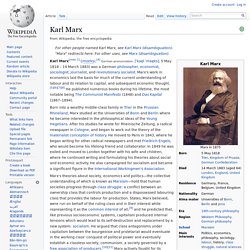
Marx's work in economics laid the basis for much of the current understanding of labour and its relation to capital, and subsequent economic thought.[5][6][7][8] He published numerous books during his lifetime, the most notable being The Communist Manifesto (1848) and Das Kapital (1867–1894). Born into a wealthy middle-class family in Trier in the Prussian Rhineland, Marx studied at the Universities of Bonn and Berlin where he became interested in the philosophical ideas of the Young Hegelians. After his studies he wrote for Rheinische Zeitung, a radical newspaper in Cologne, and began to work out the theory of the materialist conception of history. Early life[edit] Childhood and early education: 1818–1835[edit] Karl Marx was born on 5 May 1818 to Heinrich Marx and Henrietta Pressburg (1788-1863).
John Maynard Keynes. John Maynard Keynes, 1st Baron Keynes,[1] CB, FBA (/ˈkeɪnz/ KAYNZ; 5 June 1883 – 21 April 1946) was a British economist whose ideas have fundamentally affected the theory and practice of modern macroeconomics, and informed the economic policies of governments.
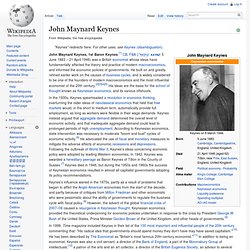
He built on and greatly refined earlier work on the causes of business cycles, and is widely considered to be one of the founders of modern macroeconomics and the most influential economist of the 20th century.[2][3][4][5] His ideas are the basis for the school of thought known as Keynesian economics, and its various offshoots. In 1999, Time magazine included Keynes in their list of the 100 most important and influential people of the 20th century, commenting that: "His radical idea that governments should spend money they don't have may have saved capitalism. "[10] He has been described by The Economist as "Britain's most famous 20th-century economist. Early life and education[edit] King's College, Cambridge. Milton Friedman. Amartya Sen. Amartya Kumar Sen (Bengali: অমর্ত্য সেন; born 3 November 1933) is an Indian economist and philosopher who since 1972 has taught and worked in the United Kingdom and the United States.
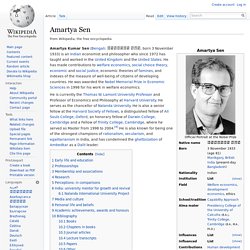
He has made contributions to welfare economics, social choice theory, economic and social justice, economic theories of famines, and indexes of the measure of well-being of citizens of developing countries. He was awarded the Nobel Memorial Prize in Economic Sciences in 1998 for his work in welfare economics. He is currently the Thomas W. Lamont University Professor and Professor of Economics and Philosophy at Harvard University. He serves as the chancellor of Nalanda University. Early life and education[edit] Sen was born in a Bengali Vaidya family in Manikganj, Bangladesh, to Ashutosh Sen and Amita Sen.